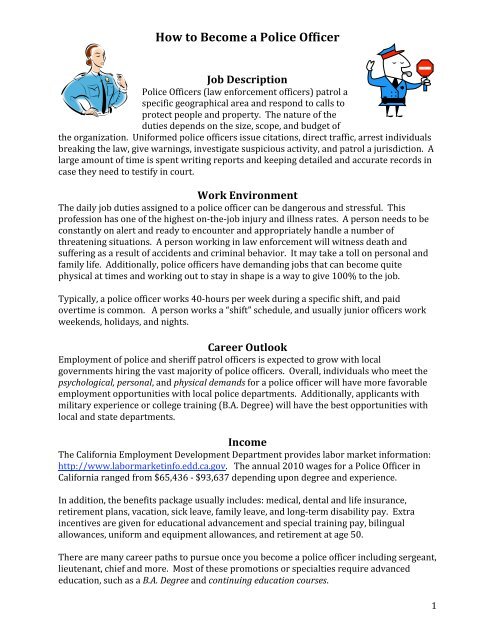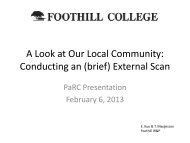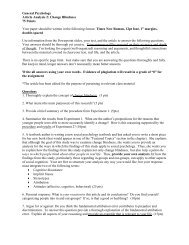How to Become a Police Officer - Foothill College
How to Become a Police Officer - Foothill College
How to Become a Police Officer - Foothill College
You also want an ePaper? Increase the reach of your titles
YUMPU automatically turns print PDFs into web optimized ePapers that Google loves.
<strong>How</strong> <strong>to</strong> <strong>Become</strong> a <strong>Police</strong> <strong>Officer</strong> <br />
1 <br />
Job Description<br />
<strong>Police</strong> <strong>Officer</strong>s (law enforcement officers) patrol a <br />
specific geographical area and respond <strong>to</strong> calls <strong>to</strong> <br />
protect people and property. The nature of the <br />
duties depends on the size, scope, and budget of <br />
the organization. Uniformed police officers issue citations, direct traffic, arrest individuals <br />
breaking the law, give warnings, investigate suspicious activity, and patrol a jurisdiction. A <br />
large amount of time is spent writing reports and keeping detailed and accurate records in <br />
case they need <strong>to</strong> testify in court. <br />
<br />
Work Environment <br />
The daily job duties assigned <strong>to</strong> a police officer can be dangerous and stressful. This <br />
profession has one of the highest on‐the‐job injury and illness rates. A person needs <strong>to</strong> be <br />
constantly on alert and ready <strong>to</strong> encounter and appropriately handle a number of <br />
threatening situations. A person working in law enforcement will witness death and <br />
suffering as a result of accidents and criminal behavior. It may take a <strong>to</strong>ll on personal and <br />
family life. Additionally, police officers have demanding jobs that can become quite <br />
physical at times and working out <strong>to</strong> stay in shape is a way <strong>to</strong> give 100% <strong>to</strong> the job. <br />
<br />
Typically, a police officer works 40‐hours per week during a specific shift, and paid <br />
overtime is common. A person works a “shift” schedule, and usually junior officers work <br />
weekends, holidays, and nights. <br />
<br />
Career Outlook <br />
Employment of police and sheriff patrol officers is expected <strong>to</strong> grow with local <br />
governments hiring the vast majority of police officers. Overall, individuals who meet the <br />
psychological, personal, and physical demands for a police officer will have more favorable <br />
employment opportunities with local police departments. Additionally, applicants with <br />
military experience or college training (B.A. Degree) will have the best opportunities with <br />
local and state departments. <br />
<br />
Income <br />
The California Employment Development Department provides labor market information: <br />
http://www.labormarketinfo.edd.ca.gov. The annual 2010 wages for a <strong>Police</strong> <strong>Officer</strong> in <br />
California ranged from $65,436 ‐ $93,637 depending upon degree and experience. <br />
<br />
In addition, the benefits package usually includes: medical, dental and life insurance, <br />
retirement plans, vacation, sick leave, family leave, and long‐term disability pay. Extra <br />
incentives are given for educational advancement and special training pay, bilingual <br />
allowances, uniform and equipment allowances, and retirement at age 50. <br />
<br />
There are many career paths <strong>to</strong> pursue once you become a police officer including sergeant, <br />
lieutenant, chief and more. Most of these promotions or specialties require advanced <br />
education, such as a B.A. Degree and continuing education courses. <br />
<br />
<strong>How</strong> <strong>to</strong> <strong>Become</strong> a <strong>Police</strong> <strong>Officer</strong> <br />
<br />
Requirements <br />
A person can be hired as a police officer with a high school diploma or GED. A college <br />
degree or 1‐2 years of college coursework is recommended, especially for pay raises and <br />
promotions. State and Federal agency jobs require applicants <strong>to</strong> possess a 4‐year college <br />
degree. <br />
<br />
A candidate must: <br />
• Be a U.S. citizen, 21 years of age or older <br />
• Meet demanding physical and personal qualifications <br />
• Undergo a variety of tests (physical, medical, written and psychological) <br />
• Pass a background check <br />
• Speak a second language is a definite assets <strong>to</strong> work in federal agencies and urban <br />
departments <br />
<br />
Education Requirements <br />
What <strong>to</strong> major in? Many colleges offer an A.S. Degree or B.A. Degree in <br />
Criminal Justice, Law Enforcement, Administration of Justice, Political Science, or Public <br />
Administration, although majors in Sociology or Psychology are also sought after degrees. <br />
<br />
A.S. Degree, Corrections A.S. Degree, Administration of Justice <br />
A.S. Degree, Law Enforcement DeAnza <strong>College</strong> <br />
<strong>College</strong> of San Mateo <br />
City <strong>College</strong> of San Francisco B.A. Degree, Criminology (Sociology) <br />
Evergreen Valley <strong>College</strong> CSU San Jose State University <br />
Gavilan <strong>College</strong> <br />
San Jose City <strong>College</strong> B.A. Degree, Criminal Justice <br />
West Valley <strong>College</strong> CSU San Francisco State University <br />
<br />
<br />
Courses vary, but usually include the following <strong>to</strong>pics: <br />
<br />
Abnormal Psychology General Psychology & General Sociology <br />
Correctional Counseling Juvenile Delinquency <br />
Criminal Investigation Patrol and Traffic <br />
Criminal Law Penology & Law of Arrest, Search & Seizure <br />
Criminology Personal Defense <br />
Correctional Systems <strong>Police</strong>/Community Relations <br />
Crime Prevention Probation and Parole <br />
<br />
<br />
<br />
<br />
<br />
<br />
<br />
2
<strong>How</strong> <strong>to</strong> <strong>Become</strong> a <strong>Police</strong> <strong>Officer</strong> <br />
<br />
<br />
Exams <br />
Civil Service Exam: <br />
When a person is ready <strong>to</strong> apply <strong>to</strong> a police department, s/he will take a civil service <br />
examination that is administered by the police department a person is applying <strong>to</strong>. The <br />
civil service exam is offered whenever a department has job openings, and some <br />
departments might offer the exam on a regular basis <strong>to</strong> maintain a pool of eligible recruits. <br />
<br />
Physical Exam: <br />
To secure a job in law enforcement, a candidate will also be tested on stamina, vision, <br />
hearing, strength, and agility. If these tests are passed successfully, a person will take drug <br />
and lie detec<strong>to</strong>r tests and began a series of interviews with the police department. After <br />
these tests are passed successfully, a candidate will then be sent <strong>to</strong> the police academy for <br />
training in law enforcement. <br />
<br />
Training (<strong>Police</strong> Academy) <br />
Once a candidate is accepted <strong>to</strong> a police department they will attend training at an academy <br />
for 12 weeks <strong>to</strong> 1 year depending on the department. For state and local police <br />
departments that hire a large recruiting pool, a recruit will be trained directly by the <br />
department (typically for 12‐14 weeks). For small‐size police departments, recruits often <br />
attend a regional or state academy. <br />
<br />
In some states, it is possible <strong>to</strong> attend a police academy first (without being affiliated with a <br />
specific police department) and then apply in<strong>to</strong> police departments as a full trained police <br />
officer. This is a path for a person who is not sure about the area in which s/he would like <br />
<strong>to</strong> work. Contact a local police department and request the requirements for a police <br />
officer and the application materials. <br />
<br />
The <strong>Police</strong> Academy includes classroom instruction and field training on: <br />
Constitutional law Accident investigation First aid <br />
Civil rights Patrol Emergency response <br />
State laws Use of firearms Traffic control <br />
Local ordinances Self‐defense <br />
<br />
After a cadet finishes the academy, an experienced supervisor will men<strong>to</strong>r him/her and <br />
perfect the knowledge and skills learned in the <strong>Police</strong> Academy. This will include filing the <br />
correct paperwork, incident reports, discharge forms, testifying when in court, and search <br />
and arrest procedures. <br />
<br />
<br />
<br />
<br />
<br />
<br />
<br />
3
<strong>How</strong> <strong>to</strong> <strong>Become</strong> a <strong>Police</strong> <strong>Officer</strong> <br />
<br />
<br />
Sources of Additional Information <br />
<br />
<br />
American Polygraph Association <br />
www.polygraph.org <br />
1‐800‐272‐8037 <br />
<br />
American Rescue Team International (ARTI) <br />
www.amerrescue.org <br />
(415) 533‐2231 <br />
<br />
International Association for Identification <br />
www.theiai.org <br />
(651) 681‐8566 <br />
<br />
International Crime Scene Investiga<strong>to</strong>rs Association (ICSIA) <br />
www.icsia.org <br />
<br />
North American <strong>Police</strong> Dog Work Association (NAPWDA) <br />
www.napwda.com <br />
1‐888‐4CANINE <br />
<br />
Occupational Outlook Handbook <br />
2010‐2011 <br />
Available in the Career Center Library <br />
<br />
Eureka: The California Career Information System <br />
www.eureka.org <br />
Site Code: For current <strong>Foothill</strong> students only, please contact the Career Center <br />
<br />
Career Center Resource Library <br />
Room 8329 <br />
(650) 949‐7229 <br />
<br />
California Employment Development Department <br />
http://www.labormarketinfo.edd.ca.gov/ <br />
<br />
Bureau of Labor Statistics by the U.S. Dept. of Labor <br />
http://www.bls.gov/ <br />
<br />
4

















